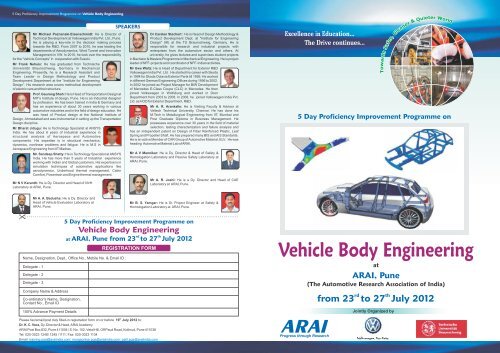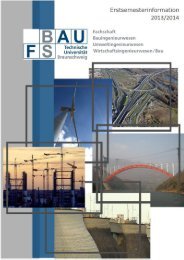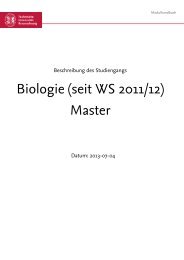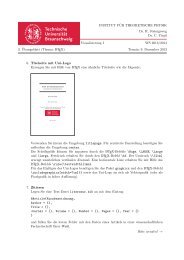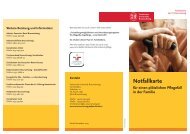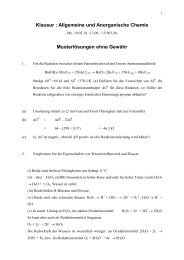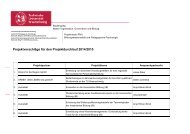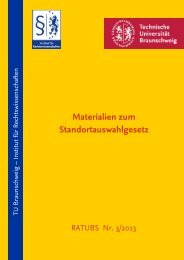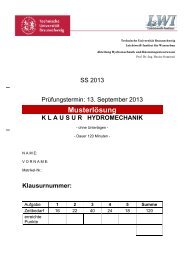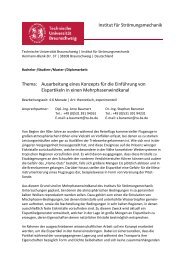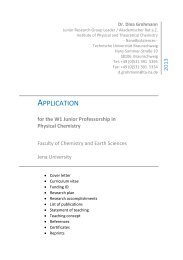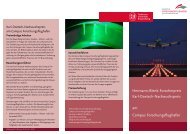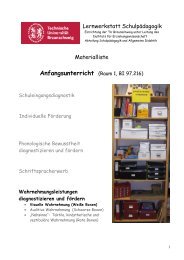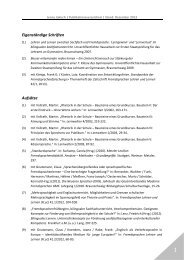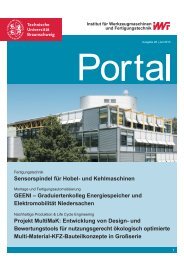Vehicle Body Engineering - Technische Universität Braunschweig
Vehicle Body Engineering - Technische Universität Braunschweig
Vehicle Body Engineering - Technische Universität Braunschweig
Create successful ePaper yourself
Turn your PDF publications into a flip-book with our unique Google optimized e-Paper software.
Mr Michael Poznanski-Eisenschmidt: He is Director of<br />
Technical Development at Volkswagen India Pvt. Ltd., Pune.<br />
He is playing a key-role in the decision making process<br />
towards the R&D. From 2007 to 2010, he was leading the<br />
departments of Aerodynamics, Wind Tunnel and Innovation<br />
Management in VW. In 2010, he took over the responsibility<br />
for the “<strong>Vehicle</strong> Concepts” in cooperation with Suzuki.<br />
Mr Frank Nehuis: He has graduated from <strong>Technische</strong><br />
<strong>Universität</strong> <strong>Braunschweig</strong>, Germany in Mechanical<br />
<strong>Engineering</strong>. Presently, he is a Research Assistant and<br />
Team Leader in Design Methodology and Product<br />
Development Department at the “Institute for <strong>Engineering</strong><br />
Design”. His research area covers methodical development<br />
of electric cars and their structure.<br />
Prof. Gaurang Shah: He is Head of Transportation Design at<br />
MIT's Institute of design, Pune. He is an Industrial designer<br />
by profession. He has been trained in India & Germany and<br />
has an experience of about 30 years working in various<br />
automotive industries and in the field of design education. He<br />
was head of Product design at the National Institute of<br />
Design, Ahmedabad and was instrumental in setting up the Transportation<br />
Design discipline.<br />
Mr Bharat Jidugu: He is Technology Specialist at ANSYS<br />
India. He has about 6 years of Industrial experience in<br />
structural analysis of Aerospace and Automotive<br />
components. His expertise is in structural mechanics,<br />
dynamics, nonlinear problems and fatigue. He is M.S in<br />
Aerospace <strong>Engineering</strong> from IIT Madras.<br />
Mr. Sandeep Shetty: He is Technology Specialist at ANSYS<br />
India. He has more than 5 years of Industrial experience<br />
working with Indian and Global customers. His expertise is in<br />
simulation techniques of automotive applications like<br />
aerodynamics, Underhood thermal management, Cabin<br />
Comfort, Powertrain and Engine thermal management.<br />
Mr N V Karanth: He is Dy. Director and Head of NVH<br />
Laboratory at ARAI, Pune.<br />
Mr A. A. Badusha: He is Dy. Director and<br />
Head of <strong>Vehicle</strong> Evaluation Laboratory at<br />
ARAI, Pune.<br />
Name, Designation, Dept., Office No., Mobile No. & Email ID :<br />
Delegate - 1<br />
Delegate - 2<br />
Delegate - 3<br />
Company Name & Address<br />
Co-ordinator's Name, Designation,<br />
Contact No., Email ID<br />
100% Advance Payment Details<br />
SPEAKERS<br />
REGISTRATION FORM<br />
th<br />
Please fax/email/post duly filled-in registration form on or before 19 July 2012 to:<br />
Dr. K. C. Vora, Dy. Director & Head, ARAI Academy<br />
ARAI Post Box 832, Pune 411004 / S. No. 102, Vetal Hill, Off Paud Road, Kothrud, Pune 411038<br />
Tel: 020-3023 1248/ 1245 /1111, Fax: 020-3023 1104<br />
Email: training.pga@araiindia.com; morgaonkar.pga@araiindia.com; patil.pga@araiindia.com<br />
Dr Carsten Stechert : He is Head of Design Methodology &<br />
Product Development Dept. at "Institute for <strong>Engineering</strong><br />
Design" (IK) at the TU <strong>Braunschweig</strong>, Germany. He is<br />
responsible for research and industrial projects with<br />
enterprises from the automotive sector and others. At<br />
university, he gives lectures and supervises student projects<br />
in Bachelor & Masters Programme in Mechanical <strong>Engineering</strong>. He is project<br />
leader of NFF-projects and coordinator of NFF-Indian activities.<br />
Mr Uwe Waltz: He is Head of Department for Exterior R&D<br />
Volkswagen India Pvt. Ltd. He started his career with Skoda<br />
in 1994 for Skoda Octavia Exterior Parts till 1995. He worked<br />
in different German <strong>Engineering</strong> Offices during 1996 to 2002.<br />
In 2002 he joined as Project Manager for BIW Development<br />
of Mercedes E-Class Coupe (CLC) in Mercedes. He then<br />
joined Volkswagen in Wolfsburg and worked in Door<br />
Department from 2003 to 2008. In 2008, he joined Volkswagen India Pvt.<br />
Ltd. as HOD for Exterior Department, R&D.<br />
Mr A. R. Arankalle: He is Visiting Faculty & Advisor at<br />
Veltech Technical University, Chennai. He has done his<br />
M.Tech in Metallurgical <strong>Engineering</strong> from IIT, Mumbai and<br />
Post Graduate Diploma in Business Management. He<br />
possesses experience over 30 years in the field of material<br />
selection, testing characterization and failure analysis and<br />
has an independent patent on Design of Fiber Reinforced Plastic, Leaf<br />
Spring and Propeller Shaft. He has prepared many BIS and AIS Standards.<br />
He is an active Member of CAR Group of Automotive Material, ELV. He was<br />
heading Automotive Material Lab of ARAI.<br />
Mr A V Mannikar: He is Dy. Director & Head of Safety &<br />
Homologation Laboratory and Passive Safety Laboratory at<br />
ARAI, Pune.<br />
Mr A. R. Joshi: He is a Dy. Director and Head of CAE<br />
Laboratory at ARAI, Pune.<br />
Mr B. S. Yamgar: He is Sr. Project Engineer at Safety &<br />
Homologation Laboratory at ARAI, Pune.<br />
Excellence in Education…<br />
The Drive continues…<br />
Jointly Organized by
A host of important and interactive factors contribute to the<br />
successful design of any production vehicle. However, the<br />
combination of Power train, <strong>Body</strong>–in–White and low-drag platform<br />
design, with emphasis on vehicle mass and drag coefficient<br />
reductions, appears prerequisite to the simultaneous optimization<br />
of efficiency, safety, emissions, performance and cost. The aim of<br />
this module is to elaborate on the concept, styling, construction,<br />
design and analysis of vehicle bodies. This will cover bodies of<br />
cars, bus and commercial vehicle cab. It will help the delegates to<br />
understand methods of analysis applicable to design and<br />
development of whole vehicle platform, with emphasis on body &<br />
chassis performance.<br />
On completion of the module, the delegates should be able<br />
to:<br />
n<br />
n<br />
n<br />
n<br />
n<br />
n<br />
n<br />
n<br />
n<br />
n<br />
n<br />
n<br />
n<br />
n<br />
n<br />
n<br />
n<br />
BACKGROUND & OBJECTIVES PROGRAMME<br />
INTENDED LEARNING OUTCOMES<br />
Understand the vehicle development process and<br />
parametrical car body design.<br />
Understand the strategies to vehicle body design for safety,<br />
comfort, aesthetics and economy.<br />
Understand the attributes of <strong>Body</strong>–in–White (BIW).<br />
Understand the principles and robustness of Finite Element<br />
Methods (FEM) / Computer Aided <strong>Engineering</strong> (CAE) and<br />
apply these techniques for analysis of automotive vehicle<br />
structures for cost effective design.<br />
Understand the validation techniques.<br />
Understand the issues related to the impact crashworthiness<br />
designs for the protection of both pedestrians and<br />
passengers.<br />
Understand the principles of body materials.<br />
Understand the principles of Ground <strong>Vehicle</strong> Aerodynamics<br />
(GVA) and structural Noise Path Analysis (NPA).<br />
Be aware of the current R&D in the field of <strong>Vehicle</strong> <strong>Body</strong><br />
<strong>Engineering</strong> through case studies.<br />
Apply critical analysis in the solution of current automotive<br />
structure problems.<br />
Use informed judgment to analysis and interpret stress/<br />
strain, noise, aerodynamic pressure data, etc.<br />
Demonstrate a comprehensive understanding of advanced<br />
techniques applicable to designing a vehicle body / chassis.<br />
Maintain a sound theoretical approach, informed by the latest<br />
professional practice, to facilitate the introduction of new and<br />
advancing technologies.<br />
Take an holistic approach, applying professional judgments,<br />
balancing costs, benefits, safety, quality, reliability,<br />
appearance, etc.<br />
Lead Multi disciplinary teams.<br />
Demonstrate independent learning ability necessary for<br />
conducting professional development.<br />
Become self-disciplined and self-motivated, demonstrating<br />
personal responsibility in the pursuit of studies and<br />
professional practice.<br />
Day One<br />
08.30 - Registration<br />
09.30 - Inauguration & Welcome Address<br />
10.00 - <strong>Vehicle</strong> Development Process (Requirements, Goal,<br />
Definition, Processes, Decisions)<br />
14.00 - Lunch<br />
15.00 - Parametrical Car <strong>Body</strong> Design<br />
(Tools and Requirements)<br />
17.00 - Conclusion<br />
Day Two<br />
09.00 - Design Attributes<br />
(Package, Car <strong>Body</strong> Structure, Safety)<br />
14.00 - Lunch<br />
15.00 - Case Studies<br />
16.30 - BIW<br />
18.00 - Conclusion<br />
Day Three<br />
09.00 - Styling of <strong>Vehicle</strong> <strong>Body</strong><br />
10.00 - Ground <strong>Vehicle</strong> Aerodynamics (GVA)<br />
12.00 - Structural Analysis of <strong>Vehicle</strong> <strong>Body</strong><br />
14.00 - Lunch<br />
15.00 - Frontal Impact Crashworthiness<br />
16.30 - Visit to Passive Safety Lab<br />
17.00 - Conclusion<br />
Day Four<br />
09.00 - Crashworthiness of Car BIW<br />
10.30 - Integrated Design of Truck Cab for Occupant<br />
Safety and Structural Integrity<br />
12.00 - Side Door Intrusions & Internal Fittings of a Car<br />
13.00 - Visit to Safety & Homologation Lab<br />
14.00 - Lunch<br />
15.00 - Code of Practice for Bus <strong>Body</strong><br />
16.00 - Visit to Knowledge Center<br />
17.00 - Conclusion<br />
Day Five<br />
09.00 - <strong>Vehicle</strong> <strong>Body</strong> NVH<br />
10.00 - Materials for <strong>Vehicle</strong> <strong>Body</strong><br />
13.30 - Visit to Automotive Materials Lab<br />
14.00 - Lunch<br />
15.00 - Written Test<br />
15.30 - Feedback Session<br />
16.00 - Valedictory function<br />
16.30 - Conclusion<br />
Note : ARAI reserves the right to change the dates, schedule, contents, speakers, venue etc. for the programme without any notice.<br />
n<br />
n<br />
n<br />
n<br />
n<br />
n<br />
WHO SHOULD ATTEND ? REGISTRATION FEES<br />
Organizations involved in R&D, design, manufacturing,<br />
testing, instrumentation, special purpose vehicles, bus body &<br />
commercial vehicle cab builders and analysis of all types of<br />
vehicles.<br />
Automotive component manufacturers and suppliers of<br />
advanced / light weight materials.<br />
Engineers working in the areas of FEM / CAE / NVH / NPA /<br />
TPA/GVA/ SAFETY<br />
<strong>Engineering</strong> / consulting companies<br />
Professors / engineering college students<br />
Engineers interested in pursuing further studies on part time<br />
or full time basis<br />
MODE OF PAYMENT<br />
At Par / Multicity cheque or demand draft in favour of<br />
The Automotive Research Association of India<br />
payable at Pune.<br />
ARAI, over four & half decades, has provided its design and development<br />
expertise to the Indian automotive industry, focusing on the testing and<br />
evaluation of components and systems to meet national and international<br />
standards. ARAI strives to achieve international recognition in these<br />
areas. In keeping with the globalization of economy and business, ARAI<br />
continues to enlarge its scope of services to meet the requirements of<br />
automotive industries around the world. In addition to utilizing state-ofthe-art<br />
technology, laboratories and highly-trained personnel, ARAI<br />
recognizes the need to develop a new generation of engineers to meet the<br />
demands of the automotive industry, not just in India but across the globe.<br />
ARAI ACADEMY is classified into three divisions:<br />
LEARNING CENTRE has embarked upon a programme of building up<br />
human resources by commencing educational programme (Graduate<br />
and Post graduate) with specialization in Automotive <strong>Engineering</strong>. It has<br />
tied up with VIT University (Vellore), Veltech University (Chennai),<br />
College of <strong>Engineering</strong> (Pune), University of Alabama (USA),<br />
Loughborough University (UK) and University of <strong>Braunschweig</strong><br />
(Germany).<br />
KNOWLEDGE CENTRE has collection of around 12,000 books &<br />
standards, 50,000 technical papers and numerous journals, technical<br />
reports and seminar / conference proceedings. It publishes monthly<br />
magazine 'Automotive Abstracts' and supplies CDs of CMVR Type<br />
Approval Handbook and Automotive Industry Standards (AIS).<br />
TRAINING CENTRE has devised various Domain Training Programmes<br />
(DTPs) & Proficiency Improvement Programmes (PIPs). It gives<br />
engineers, faculty and students knowledge and technical expertise in a<br />
wide range of automotive disciplines. It helps in understanding system's<br />
view point for automotive design and manufacture, with specific skills in<br />
formulating automotive engineering solution in terms of their function and<br />
performance, through optional modules.<br />
Please visit www.araiindia.com for more information.<br />
Category Registration Total Fees including<br />
Fees (Rs.) Tax of 12.36% (RS.)<br />
(per participant) (per participant)<br />
Engineers & 25000 28090<br />
Professionals<br />
Teaching Faculty 15000 16854<br />
<strong>Engineering</strong> 10000 11236<br />
College Students<br />
Registration fees include :<br />
n Breakfast n Lunch n Delegate kit<br />
<strong>Technische</strong> <strong>Universität</strong> <strong>Braunschweig</strong> is the oldest<br />
University of Technology in Germany. It was founded in 1745<br />
as Collegium Carolinum and is a member of TU9, an<br />
incorporated society of the most renowned and largest<br />
German Institutes of Technology. It has an excellent<br />
reputation in the international research ranked as the Top 10<br />
in Germany. Today it has about 13,000 students, making it<br />
the third largest university in Lower Saxony.<br />
Strengths of <strong>Braunschweig</strong> University are Inter-disciplinary<br />
Studies - Interdisciplinary programs, thinking and research in<br />
networks and projects, research live and up close,<br />
professional competence and key qualifications hand-inhand,<br />
practical references including: Research Projects like<br />
Intelligent <strong>Vehicle</strong>, Low Emission <strong>Vehicle</strong>s, Flexible <strong>Vehicle</strong><br />
concepts, Product and Life Cycle Management, Micro Air<br />
<strong>Vehicle</strong>s, Hybrid Engines and Digital Video Broadcasting.<br />
It has various institutes such as Institute of Automotive<br />
<strong>Engineering</strong>, Institute for <strong>Engineering</strong> Design, Institute of<br />
Internal Combustion Engines, Institute of Automotive<br />
Management and Industrial Production, Institute of Machine<br />
Tools and Production Technology, etc. Automotive research<br />
activities of various institutes are consolidated in the<br />
Automotive Research Centre Niedersachsen (NFF).<br />
The Institute for <strong>Engineering</strong> Design (IK) works mainly in the<br />
research fields for Low Emission <strong>Vehicle</strong>s and Flexible<br />
<strong>Vehicle</strong> concepts. Its chair is Prof. Dr. Thomas Vietor who<br />
worked 15 years in different positions in automotive industry<br />
before he started as Professor in his current position.<br />
Please visit http://www.tu-braunschweig.de for more<br />
information.<br />
Volkswagen India Pvt. Ltd. has full fledged car manufacturing plant in Chakan near Pune, covering 2.3 millions square meter (575<br />
Acres) with a total investment of INR 3,800 Crores (580 Million Euros). The plant inaugurated on 31st March, 2009 with a production<br />
capacity of 1,30,000 vehicles/year covers the entire production process from press shop to the body shop and paint shop to final<br />
assembly. The <strong>Body</strong> shop uses the Diode Laser Brazing (DLB) technology, whereas the Roof & Side Framer laser technology is used for<br />
welding the roof to the body of the car. Its full-fledged production has taken off at the plant with the production of the Skoda Fabia in May<br />
2009, followed by a Polo based model in December 2009 and lately the Volkswagen Vento since 3 August, 2010.<br />
Please visit www.volkswagen.co.in for more information.


